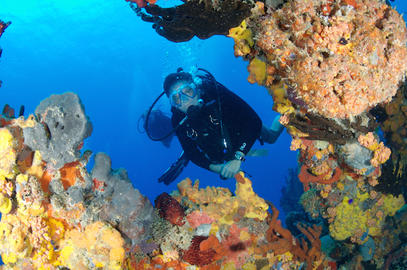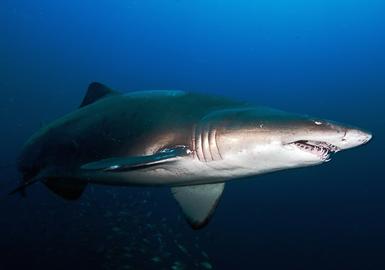Online 'Fishinar' - free for anyone to join in this webinar.
Sign up here: http://www.reef.org/fishinars
Free online 'Fishinar' - register here:
Online webinar, free!
Sign up here: http://www.reef.org/fishinars
This free one hour webinar is taught by shark expert, Dr. Dean Grubbs.
Text by Erin Spencer, Photos courtesy of Lad Akins
A recent study published in Ecology and Evolution offers a new approach to traditional mark and recapture studies while providing valuable insight into the growth and movement patterns of invasive lionfish. Lad Akins, Dr. James Morris, and Dr. Stephanie Green teamed up to develop a novel way of visually tagging fish underwater, minimizing both tagging time and fish trauma.
Information on fish movement and growth is primarily obtained through the marking and tracking of individuals with external tags, which are usually affixed to anesthetized individuals at the surface. However, the quantity and quality of data obtained by this method is often limited by small sample sizes owing to the time associated with the tagging process, high rates of tagging-related mortality, and displacement of tagged individuals from the initial capture location.
REEF members are at the heart of our grassroots marine conservation programs. Over 50,000 divers, snorkelers, students, and armchair naturalists stand behind our mission.
This month we highlight Daryl Duda. Daryl has been a REEF member since 2012, and has conducted 43 surveys. He is working his way up the ranks, and is now a Level 3 Surveyor! Here's what Daryl had to say about REEF:
When and how did you first volunteer with REEF or become a REEF member?
We've got lots of exciting, fun, and educational REEF Fishinars in store for you this fall - featuring your favorite instructors and special guests. Check out the full schedule at www.REEF.org/fishinars. REEF Fishinars are a free benefit of REEF membership, and did you know that REEF members can also access and view any of our archived Fishinars from previous years? Fishinars coming up include:
Do you think REEF is doing great work? Please take a few minutes to tell others about your experience with REEF! Your personal story and feedback help us gain visibility and help us improve. Please share your experience through the GreatNonprofits.org website at: http://gr8np.org/go/yKD
Here's an excerpt from a recent review from a fellow REEF member:



